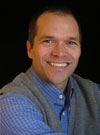
Rich Geenen
Biography:
I have been teaching philosophy at Westminster since the fall of 2000. Philosophy is a discipline that has intrigued me ever since I had my first philosophy and literature class as a senior in high school, a course that asked you to think for yourself and to contemplate the most fundamental questions of values and existence. I couldn't get enough of it then and little has changed to this day. But how did I get to where I am now, a tenured professor of philosophy at Westminster?
I earned my BA in philosophy from Northwestern University in Evanston, Illinois. There I studied ethics and social and political philosophy, met my future wife Siri with whom I'd talk in the hallways of our dorm until all hours of the morning, and contemplated a career in law or philosophy. Needless to say, I chose the latter.
I headed to Boulder, Colorado in 1993, and by 1999 I had received my MA and PhD. I worked under Christopher Shields, now at Oxford, and wrote my doctoral dissertation relating to the metaphysics of Plato's theory of forms. At the same time I enjoyed teaching philosophy courses across the philosophical spectrum, e.g. ranging from philosophy of religion to ancient philosophy to bioethics. Yet my time in Boulder was not merely focused on academics. Aside from the time I spent with Siri, now my wife, I also made time to explore the mountains of Colorado and my newfound passion, fly-fishing. In the shadows of unparalleled peaks, small mountain streams and cold mountain lakes drew me into their splendor, and the art of fly-fishing made my escapes complete. To this day I still dream of the solitude and beauty of the mountains when my mind needs its escape.
I headed to Boulder, Colorado in 1993, and by 1999 I had received my MA and PhD. I worked under Christopher Shields, now at Oxford, and wrote my doctoral dissertation relating to the metaphysics of Plato's theory of forms. At the same time I enjoyed teaching philosophy courses across the philosophical spectrum, e.g. ranging from philosophy of religion to ancient philosophy to bioethics. Yet my time in Boulder was not merely focused on academics. Aside from the time I spent with Siri, now my wife, I also made time to explore the mountains of Colorado and my newfound passion, fly-fishing. In the shadows of unparalleled peaks, small mountain streams and cold mountain lakes drew me into their splendor, and the art of fly-fishing made my escapes complete. To this day I still dream of the solitude and beauty of the mountains when my mind needs its escape.
Yet philosophy is still my passion. I love to teach and to continue to learn myself. Many of my students here at Westminster have not studied philosophy before, and so I have the privilege to assist them in their first serious philosophical endeavors. As my teachers have done for me, I attempt to encourage students to contemplate contemporary moral and social and political issues that are at the fore-front of our lives (whether in the classroom or through our informal philosophy club, Philosopher's Corner). Here are sample issues: Should human beings be cloned? Is abortion the killing of a person or morally on par with killing living human tissue? Are there sound moral arguments to justify vegetarianism? Should homosexuals be allowed to be married? Is the Patriot Act justified or should it be repealed as an intrusion into our fundamental liberties? Should Intelligent Design Theory be taught in public school science classrooms? And so on. Yet these sorts of questions often demand that we ask more fundamental philosophical questions about what sort of beings we are (issues relating to human nature, free will, and personal identity) and how we come to possess and justify our beliefs (Is faith a legitimate source of knowledge? Can we obtain objective knowledge or are all of our beliefs inevitably determined by social-cultural conditioning?). Throughout these explorations I attempt to force students to unearth their own underlying assumptions and to put these assumptions to the test. In this way one is better able to achieve a truly reflective sense of who one is and what one knows. Both as members of a democratic society and merely in virtue of our human natures, it is our obligation, as Socrates intones, to examine our lives and our values reflectively for as Socrates correctly puts it, the unexamined life is not worth living.
